While I had heard of the original Majesty, I never played it back in 2001 when it was released and never caught up with it. So while fans of the game might have different thoughts based on comparisons with the original, I got to be amazed for the first time at this wonderful combination of city builder, RTS and RPG. Since then, there have been two expansions I have played and enjoyed and a third about to release as I write this. After those other expansions were released I went back through the whole game once more. And I have to say I really was amazed and surprised at how some fairly simple changes to the strategy and simulation genres mixed successfully with RPG elements could result in a very enjoyable and different-feeling experience.
The Hype:
In the world of Majesty, you are the ruler of the kingdom of Ardania. At your service are your loyal and somewhat obnoxious subordinates, who have their own minds about how things should be done. Majesty is the only game where your heroes decide on their own what should be done and when, leaving you to try to control them through monetary incentives.
The Reality:
Most strategy games put you through a fairly typical set of motions: build bases, create units, obtain resources, capture control points or complete objectives, and then repeat the entire process. There is typically a fair amount of micromanagement involved, controlling units and telling them to accomplish certain tasks for you. In Majesty 2 you are still the over-arching ruler, but instead of feeling like a field general taking troops directly into the fray, you are like the monarch telling the heroes and generals what objectives are available and incentivizing them by offering large bounties for successful completion.
So there are the two main strategic components: objective and financial management. You need to prioritize the objectives you want accomplished, make sure resources are available, and offer financial rewards to get the tasks completed. Immediately the counter-balancing of resources and rewards becomes clear: you could just offer a huge award for a task, but then you would lack the resources to build new units and buildings to help you accomplish more difficult tasks. On the other hand, you could offer stingy rewards to keep free cash for yourself, with the likely outcome that no one would ever take up your quests.
While it might seem like the removal of direct unit control would make the game simplistic, that is not true at all. What happens is that the emphasis changes to a larger world view. You are no longer directly concerned about getting a certain set of units to take out a specific objective, only that you have made enough units of a variety of types available so that when you decide to open up a reward to accomplish something, those units will have a reasonable chance of success. This is important because the game is fairly stingy: you will never have enough gold to do everything you want to do, and will be faced with tough choices at every turn. Do you upgrade your palace and guilds, do you work to build temples to gain special Templar lords, do you work on gaining a multitude of lower level heroes, or building up your blacksmith so your heroes can gain more upgrades … and so on. As I just said, you will never have enough gold for everything, so it is crucial to think about your choices.
The game is centered around a large campaign mode, which starts with a small view of your low-level palace and some surrounding homes. As you start to build guilds and other buildings, and as you start to mark locations to explore or attack, the greater world map is slowly revealed to you. The game slowly unfolds as you progress and continue building up your fledgling kingdom and developing a style of ruling and developing your influence. The story itself will likely have you thinking “I hope they aren’t serious” in the opening cutscene, and soon enough you realize that this is a game that doesn’t take itself too seriously. It is not an attempted parody that falls flat like the 2004 Bard’s Tale, but rather a light-hearted game that has plenty of over-the-top elements and humorous asides from the cheeky narrator, who was also in the original game. Voice-overs from many other characters also provide a light feel throughout.
In terms of the technical details, this is clearly a 2009 game: the graphics are rich in color and detail, with a somewhat whimsical presentation style. In a way it reminds me of other recent fantasy genre games such as Drakensang and King’s Bounty, as all of these eschew the currently-in-vogue ‘dark & gritty’ feel for a much more saturated and colorful world view. The visuals look great without the performance suffering – framerates are steady regardless of what is happening on screen, and doesn’t suffer as you zoom in or out to gain strategic or close-up views of units or battles or guilds.
The controls and user interface are introduced through the tutorial, but are immediately familiar to anyone who has played an RTS game in recent years. You use the mouse for the majority of tasks from zooming and panning the camera to selecting and tagging locations, but there are plenty of keyboard complements and alternatives. Everything works as expected to the point that I wasn’t concerned about the controls for a moment while playing – it all just flowed naturally. The sounds are also well done, with the fun voice-acting providing the highlight.
Of course, no game is without blemishes, and Majesty 2 has some of those. My biggest complaint with the game is that it starts to feel repetitive after a while, and from there gets into a cycle of getting something fresh, turning repetitive, getting something fresh, turning repetitive, and so on. On top of this, the campaign lasts no more than 20 hours, after which there are a few single player scenarios to take on and a fairly light multiplayer mode, and not much else in terms of replayability. Also, one of the big things fans of the original had mentioned was ‘freestyle mode’, a random map generator that added loads of fun replayability. Sadly that is missing here.
And while I found the graphics perfect for the game, the RTS genre has developed a strong emphasis on highly detailed and realistic graphics, and Majesty 2 lags behind in that department, which might put off some genre fans. Finally, while there were some fun characters, they seemed too few compared to what I’ve heard about the original. None of these were killers or even major flaws, just minor niggles that detracted from an otherwise excellent game.
As an aside, the ‘Gold’ version of the original game (including expansion) is available for $10 on GamersGate, Direct2Drive, Steam and Impulse, and is well worth checking out as it works on modern operating systems quite well.
Since the initial release, the developers have released significant patches to the games, fixing loads of bugs, improving performance and more. The patch adds an auto-update feature and fixes loads of issues and bugs in the game. I didn’t notice any difference in the feel of gameplay, but definitely make sure to get the most recent patch when you grab a copy of the game.
Minor issues aside, Majesty 2 was a pleasant surprise and loads of fun to play. With loads to do and enough constraints to keep you constantly engaged across the 16 missions that make up the single player campaign, the game presents challenges that are different from what the usual RTS game offers. That uniqueness makes it a blast to play, and challenges you to be careful with hero development and objective setting. The game feels like it could easily adapt to an add-on of some sort, and I hope that the developers see enough success to bring fans more playable content. Either way, if you are a fan of city-builders and strategy games, you owe it to yourself to check out this game!
Review: Majesty 2: The Fantasy Kingdom Sim
Where to Buy: Amazon.com
Price: $29.99 (Currently on sale for $4.89!)
What I Like: Innovative genre-bending game style; Nice light-hearted feel; Constant need to pay attention to choices and consequences
What Needs Improvement: Could use more content; Too few characters with strong personalities; Multiplayer is limited, random map generator would have been great
Source: Personal Copy

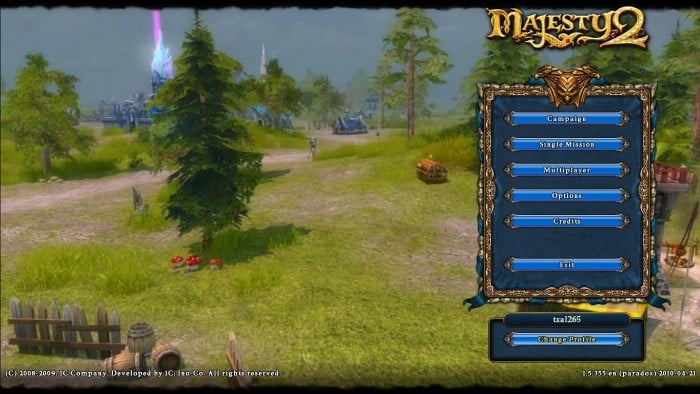
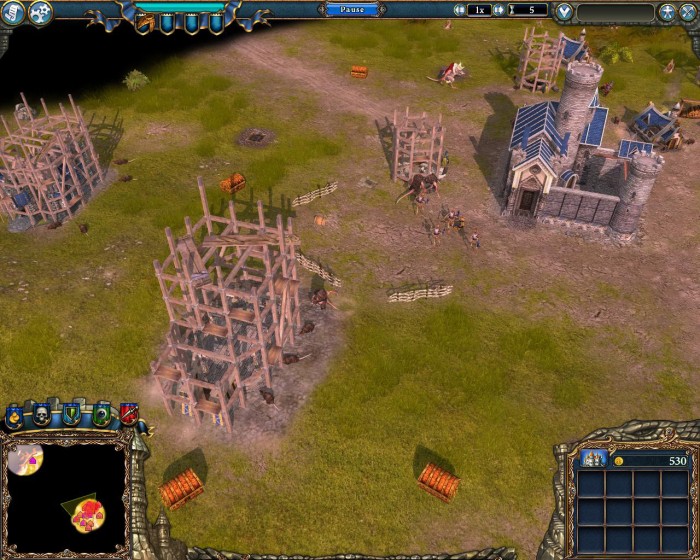
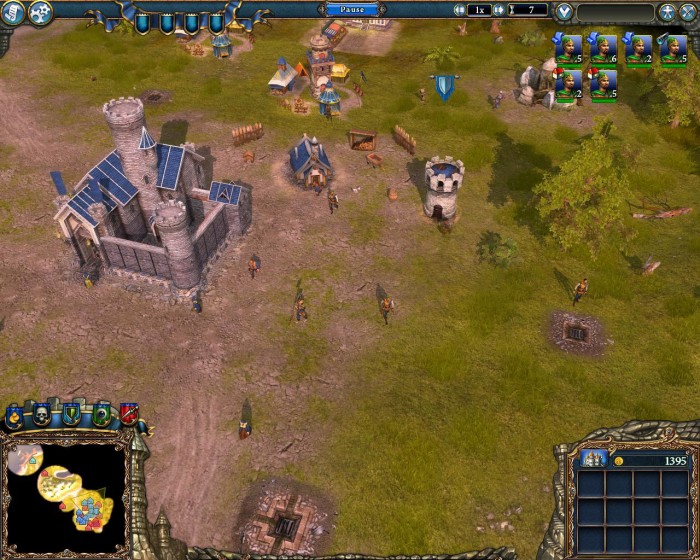
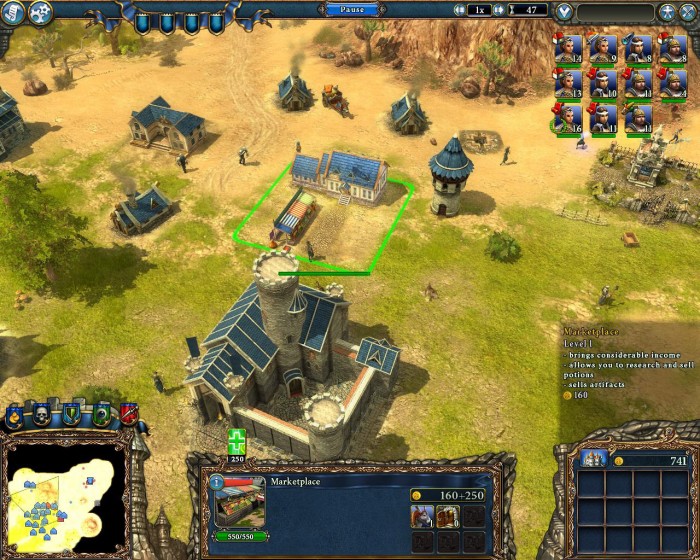
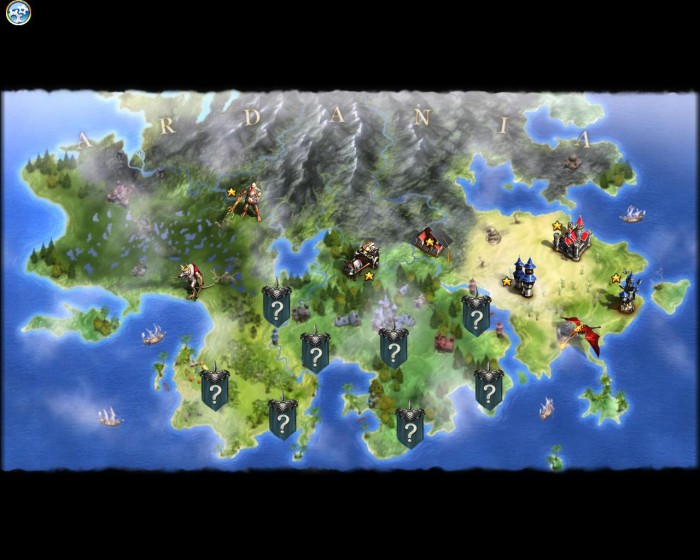
PC Game Review: Majesty 2: The Fantasy Kingdom Sim #gadgets http://bit.ly/g5oMVX
PC Game Review: Majesty 2: The Fantasy Kingdom Sim | Gear Diary: One Response to “PC Game Review: Majesty 2: The… http://bit.ly/gZyiE6